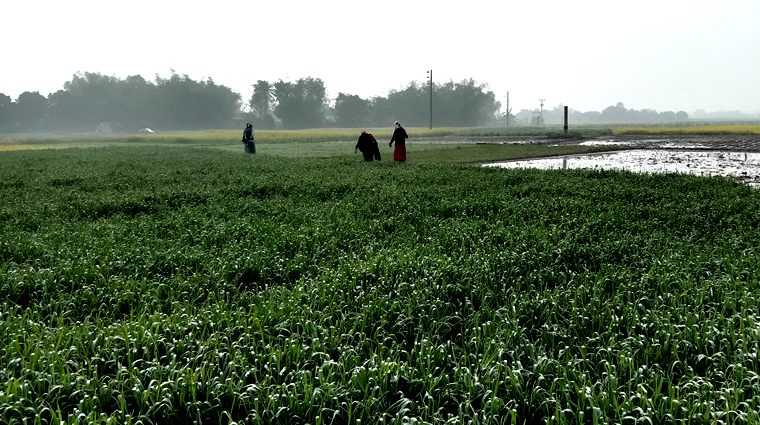
By Md Aynal Haque
RAJSHAHI, Feb 18, 2023 (BSS)- Substantial and sustainable expansion of wheat farming can mitigate the existing water-stress condition in the region, particularly the high Barind tract, as wheat is an environmentally friendly and less-irrigation crop.
Talking to BSS here separately, researchers and scientists related to agriculture, viewed time has come to enhance acreage of wheat farming instead of depending on only Irri-boro rice in the dried area to ensure food security amid the adverse impact of climate change.
They put emphasis on improving crop and soil productivity with saving Inputs through conservation agriculture.
Dr Israil Hossain, former Director General of Bangladesh Wheat and Maize Research Institute (BWMRI), mentioned seven to eight bighas of wheat could be cultivated with the irrigated water of only one bigha of boro rice through soil moisture utilization and the best uses of the modern technologies.
Under the conventional system, the single largest constraint requires planting of wheat in the region late in winter, leading to a poor yield.
Sowing bed could be a good alternative to the region's dominant wet culture, he said.
Dr Hossain suggested development and dissemination of appropriate farm machinery like power tiller operated seeder, strip till and zero till, bed planter, reaper and thresher to enhance the farm production especially wheat.
Promotion of modern technologies in wheat farming could be the effective means of boosting wheat yield as a whole.
Dr Ilias Hossain, Principal Scientific Officer of BWMRI, disseminated ideas of modern technologies among the field level agricultural officials and farmers on how to expand the wheat cultivation in the drought-prone area has become indispensable.
He said wheat plays an important role to ensure food security as its consumption is increasing day by day. But, Bangladesh produces hardly 10 lakh tonnes of wheat against the demand of around 40 lakh tonnes annually.
He, however, said Rajshahi region contributes 35 percent of total area and 44 percent of total production.
Not only that, there are around 50,000 hectares of more rain fed land in the high barind area and there has been a bright prospect of bringing the huge land under wheat cultivation.
More emphasis should be given on expansion of short duration and high-yielding wheat varieties. Seed preservation and production training need to be strengthened.
GO-NGO collaboration has become an urgent need for the new variety expansion. More support from international research organizations including CIMMYT has become required for germ-plasm especially heat- tolerant variety adoption together with yield gap minimization in the farmers field.
Dr Hossian recommended minimising the constraints for the sake of sustainable wheat production.
Farmers needed to be aware about resource conserving technologies and modern scientific methods so that wheat production remained technologically sound, economically viable, socially acceptable and environmentally secure.
More than 12.58 lakh community people of 2.66 lakh households are being motivated and encouraged towards promoting wheat like water-saving crops with intervention of the 'Integrated Water Resource Management (IWRM)' project.
The project is being implemented by DASCOH Foundation in around 1,280 drought-hit villages under 39 Union Parishads and three municipalities of eight upazilas in Rajshahi, Naogaon and Chapainawabganj districts supported by Switzerland since 2015.
Jahangir Alam Khan, Coordinator of IWRM Project, said successful promotion of less-water consuming crops in the Barind area would play a vital role to lessen the gradually mounting pressure on its underground water.
Meanwhile, more than 4.71 lakh tonnes of wheat is likely to be produced on around 1.24 lakh hectares of land in the current season in all eight districts of the division.
Department of Agricultural Extension (DAE) has set the target of producing 3.50 lakh tonnes of wheat on 89,658 hectares of land in four districts of Rajshahi Agricultural Zone, while 1.20 lakh tonnes on 34,020 hectares in four districts of Bogura Agricultural Zone.
DAE Additional Director Shamsul Wadud said they have dispersed seeds and fertilizers free of cost among 68,000 small and marginal farmers for wheat cultivation under the government's agricultural incentive programme in the division so that they can boost wheat production.